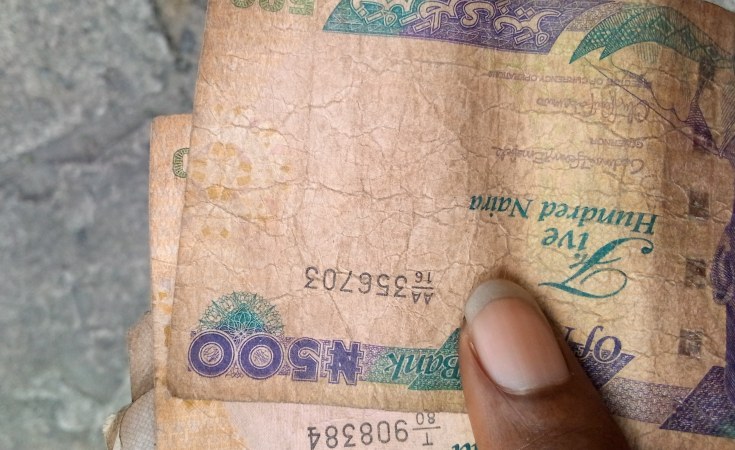Farmers and herdsmen have suffered losses in Taraba State as a result of the scarcity of naira notes, which has crashed prices of grains and cattle.
The situation is further compounded because 90 per cent of farmers and herdsmen do not have bank account numbers.
At grain and cattle markets, trading is conducted on cash-and-carry basis and both farmers and herders are rejecting cash transfer from those buying produce and animals.
Similarly, out of the 11 major grain and cattle markets located in four local government areas of the state, only Mutumbiyu town have a functional commercial bank.
Farmers and herdsmen who brought their grains and cattle to the markets were disappointed because of the absence of buyers who could transact business on the basis of cash-and-carry.
The development has compelled villagers and herdsmen to sell their produce and animals at cheaper rates, while those who were not ready to accept the low prices went home with their items.
Major grain and cattle markets in the state are in Maihula, Tella, Mutumbiyu, Jatau, Kungana and Karamti.
Others are Garba-Chede, Gazabu, Iware, MarabanBaissa and MarabanKunini.
It is only in Mutumbiyu that there is a functional commercial bank.
Further findings revealed that transactions in these markets usually run into billions of naira.
Our correspondent reports that all the markets are very far from Jalingo, the state capital, where banks are located, and those buying and selling always face the risk of moving millions of naira to the markets.
According to our findings, because of the absence of commercials banks in their locations, farmers and herders find it difficult to open bank accounts.
The few point of sale operators in most of the markets do not always have enough money to meet the cash demands of merchants, who transact business in millions of naira
This development has affected business activities in grain and cattle markets across the state, leading to crash in the prices of grains and cattle.
At Iware town in Ardo-Kola Local Government Area, where a grain and cattle market operates every Tuesday, prices have crashed to the lowest rate in recent years.
Our findings revealed that a 100kg bag of maize came down from N18,000 to N12,000.
Similarly, a 100kg bag of beans came down from N40,000 to N30,000, a bag of groundnut came down from N70,000 to N50,000, while a bag of soybeans is now sold at N21,000 as a against N32,000. A bag of dried cassava sold at N9,000 few weeks ago is now N4,500.
Prices of cattle are also affected. For example, a big cow that cost N400,000 few weeks ago is now sold at N270,000, while the size sold at the rate of N230,000 few weeks ago is now N170,000.
The situation is the same at Maihula, Garba Chede and Tella markets.
A farmer, Nuhu Adamu, who brought five bags of maize to Iware market, told Daily Trust on Sunday that he was disappointed with the poor prices of grains.
Adamu said he sold six bags of maize at N19,000 last month, but the price came down to N12,000; and he had no option than to sell his produce.
He also said there were few buyers who paid in cash, while the rest offered to pay through bank transfer, which the farmers rejected.
"Most of us do not have bank accounts; therefore, we cannot accept cash transfer. As a result of this, grain merchants who had cash exploited farmers who wanted it. They bought their produce at giveaway prices," he said.
The situation is worse in remote areas where Point of Sale (PoS) operators are hardly available.
Farm produce and cattle were brought to the markets from areas like Dakka, Tau, Nanguru, Garwa, Monkin, Kunini and Didanko, as well as several other villages.
Prices of smoked fish also came down drastically.
A cattle merchant, Bello Buba Chokka, told Daily Trust on Sunday that he brought a cow worth N250,000 in December last year, but at the market on Tuesday, he could not find a buyer who would pay him in cash.
"The practice in all the cattle markets across Taraba State is that buyers pay in cash, but now, there is scarcity of naira notes and that is why prices of cattle crashed," he said.
Chokka said he had to sell the cow at a giveaway price of N170,000 because he needed money.
He accused merchants of taking advantage of the scarcity of naira notes to exploit herdsmen and farmers.
Both farmers and cattle owners complained that if the trend continues they would become poor and not be able to go back to farm the next season.
"We reared animals to make profits and planted crops to sustain ourselves. Now, we are forced to sale our produce and animals at giveaway prices," Animu, one of the farmers lamented.
During their sensitisation tour at the Iware cattle market, officials of the Central Bank of Nigeria (CBN), led by a director of finance and statistics, Ibrahim Hassan, said they were shocked to discover that despite huge commercial activities in the area, there is no commercial bank in the local government.
Hassan promised that very soon, a commercial bank would be established in the market, and urged traders and farmers to open bank accounts so that they could do their businesses with ease.


